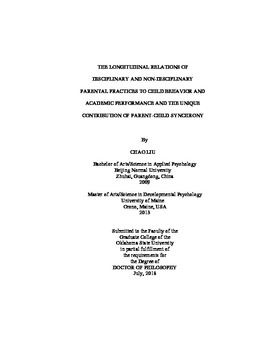| dc.contributor.advisor | Harrist, Amanda W. | |
| dc.contributor.author | Liu, Chao | |
| dc.date.accessioned | 2019-05-08T18:57:00Z | |
| dc.date.available | 2019-05-08T18:57:00Z | |
| dc.date.issued | 2018-08 | |
| dc.identifier.uri | https://hdl.handle.net/11244/319634 | |
| dc.description.abstract | This dissertation contains two studies. The first study investigated the relations between parenting practices and child social and academic outcomes. This study adopted a comprehensive approach that examined the longitudinal relations of three types of disciplinary and non-disciplinary tactics (power-assertion, positive parenting, derogatory practices) to child psychosocial adjustment and academic performance from kindergarten to second grade. Five hundred and eighty-five children (281 girls, 304 boys) and their parents (581 mothers, 577 fathers) from the Child Development Project served as the sample of this study. Results from parallel growth curve models showed that a higher level of derogatory practices was associated with a slower decrease of social competence, perhaps because children with parents who used more derogatory practices already started with a low level of social competence (the initial levels of parent derogatory practices and child social competence were negative correlated). Results from propensity score matching analysis indicated that high level, in comparison to a low level, of mother disciplinary tactics at first grade predicted lower levels of child social competence and academic performance at second grade. The second study explored the unique contribution of parent-child synchrony in child development. This study examined the construct continuity of synchrony from early childhood (kindergarten year) to middle adolescence (16 years old) and construct validity of synchrony in child social competence and academic performance after taking into account the influences of parenting practices. A subsample (N=157) of Child Development Project was included in the current study. Results indicated that mother positive synchrony at kindergarten positively predicted child social competence and academic performance at first grade whereas mother non-synchrony negatively predicted child academic performance. In regard to the father sample positive synchrony at kindergarten positively predicted both child social competence and academic performance at first grade. On the contrary, father non-synchrony positively predicted child externalizing problems. The continuity of the construct synchrony was also established such that mother positive synchrony at the kindergarten year was positively correlated with mother connectedness/balance at child age 16 but mother nonsynchrony in kindergarten was negatively correlated with mother connectedness/balance at age 16. | |
| dc.format | application/pdf | |
| dc.language | en_US | |
| dc.rights | Copyright is held by the author who has granted the Oklahoma State University Library the non-exclusive right to share this material in its institutional repository. Contact Digital Library Services at lib-dls@okstate.edu or 405-744-9161 for the permission policy on the use, reproduction or distribution of this material. | |
| dc.title | Longitudinal relations of disciplinary and non-disciplinary parental practices to child behavior and academic performance and the unique contribution of parent-child synchrony | |
| dc.contributor.committeeMember | Criss, Michael M. | |
| dc.contributor.committeeMember | Larzelere, Robert E. | |
| dc.contributor.committeeMember | Mwavita, Mwarumba | |
| osu.filename | Liu_okstate_0664D_15838.pdf | |
| osu.accesstype | Open Access | |
| dc.type.genre | Dissertation | |
| dc.type.material | Text | |
| thesis.degree.discipline | Human Development and Family Sciences | |
| thesis.degree.grantor | Oklahoma State University | |
